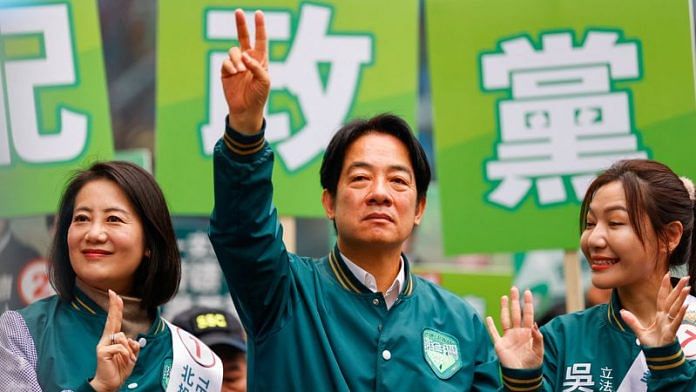As Taiwan gets ready for the presidential and legislative elections on 13 January, the substantial influence of China looms large. Chinese interference significantly affects the country’s electoral proceedings. It is evident that the outcome of Taiwan’s presidential election will profoundly shape China’s actions, the trajectory of cross-Strait relations, and the dynamics between China and the United States.
War vs peace narrative
During President Tsai Ing-wen’s tenure, cross-Strait relations saw a significant deterioration, with Taiwan emerging as a point of contention in China-US relations. Since 2016, when the Democratic Progressive Party (DPP) assumed power, China has halted cross-Strait dialogue due to the DPP’s reluctance to embrace the 1992 consensus as the basis for dialogue. This divergence in viewpoints between the DPP, perceived by China as inclining towards advocating Taiwan independence, and Beijing’s position, has strained relations. China considers DPP politicians as separatists supporting Taiwan’s independence, resulting in significant discord, which is evident in derogatory references towards the DPP on Chinese social media. For example, a prominent Weibo account labeled the DPP as “a criminal organisation involved in adultery and corruption”.
The evolving dynamics in the Taiwan Strait, compounded by the growing interests of major powers in Taiwan, have further complicated the situation. China leveraged former US House Speaker Nancy Pelosi’s visit to Taiwan in August 2022 as grounds to conduct live-fire drills, underscoring the persistent spectre of invasion in Beijing’s strategic calculations.
Taiwan’s opposition party, Kuomintang (KMT), has accused the ruling DPP of instigating strain in cross-Strait relations, presenting the upcoming vote as a decisive choice between war and peace. Former president Ma Ying-jeou, who met with Chinese President Xi Jinping in 2015, remarked, “Vote for the DPP, youth will go to the battlefield. Vote for the Kuomintang, and there will be no war on both sides of the Taiwan Strait.”
The KMT presidential candidate, incumbent New Taipei City Mayor Hou You-yi, has pledged that, “if elected, efforts will prioritise initiating limited exchanges between Taiwan and China in less contentious areas such as education, religion, culture, and economics before formal interactions are established.” His running mate Jaw Shaw-kong also furthered the war vs peace narrative by asking, “What road are they [DPP] taking? The road to war. The road that leads Taiwan into danger, the road that leads to uncertainty.”
Lai ching-te, DPP’s presidential candidate and the current vice president, responded by saying that “framing the election as a choice between peace and war is China’s external propaganda”. At an election rally, he also said that “We will not bow our heads to intimidation from China…This is not a choice between the DPP and KMT, this is a choice between Taiwan and China, between democracy and autocracy.”
However, there appears to be misconstrued discourse surrounding this matter. The Chinese Communist Party (CCP) leadership’s agenda does not simply emphasise reinitiating dialogue; instead, their objective is to set and enforce the terms and conditions of any dialogue, firmly advocating for the 1992 consensus and the One China principle as uncompromising foundations.
Also read: What’s China’s roadmap for 2024? Xi’s New Year speech shows economic stability most important
Chinese interference
While Chinese interference in Taiwanese elections is not a novel occurrence, the current instances are notably more widespread and multifaceted, encompassing tactics from economic coercion to psychological warfare. Taiwan’s Ministry of Defence has reported numerous Chinese balloons sighted over the Taiwan Strait. Moreover, on 21 December, the Customs Tariff Commission of the State Council unilaterally declared tariff reductions on certain chemicals from Taiwan, which were previously agreed upon in the Economic Cooperation Framework Agreement. The proliferation of deep fakes and fake accounts spreading disinformation is rampant across various social media platforms.
These measures aim to sway the election in favour of China that wants the 1992 consensus to be reinstated. The Tsai administration’s emphasis has been on prioritising the will of the Taiwanese people in determining Taiwan’s future. The shifting identity of Taiwanese poses a significant concern for the CCP leadership, as it complicates the prospects for peaceful reunification. Xi Jinping has notably shifted from advocating peaceful reunification to implying the potential use of force.
Will China invade Taiwan?
The lingering question remains: will China invade Taiwan? Predicting this outcome is challenging, but the results of Taiwan’s elections may offer insights. In his New Year’s Eve message, Xi reiterated his determination to reunify Taiwan with China. However, a recent report suggested that such an invasion could cost up to $10 trillion. The prospect of such a monumental cost for a war with uncertain outcomes, combined with China’s already sluggish economy, diminishes the likelihood of an imminent conflict.
Nonetheless, Taiwan faces a significant threat from China. Regardless of which opposition party—KMT or Taiwan People’s Party—triumphs, China’s pressure will persist, albeit with varying strategies. Perhaps there will be more incentives and fewer coercive tactics. Conversely, a victory for the ruling DPP might see a continuation of coercive tactics from China without any conciliatory gestures.
China’s approach towards Taiwan may fluctuate depending on the elected president and party, but its primary goal remains Taiwan’s reunification—either peacefully or by force. It is imperative to acknowledge that the prevention of an invasion hinges predominantly on China; Taiwan holds a lesser influence in this context. Regardless of the election’s outcome, the victor must adeptly navigate the challenges posed by China while safeguarding Taiwan’s interests.
Sana Hashmi, PhD, is a fellow at the Taiwan-Asia Exchange Foundation and George HW Bush Foundation for US-China Relations. She tweets @sanahashmi1. Views are personal.
(Edited by Prashant)



